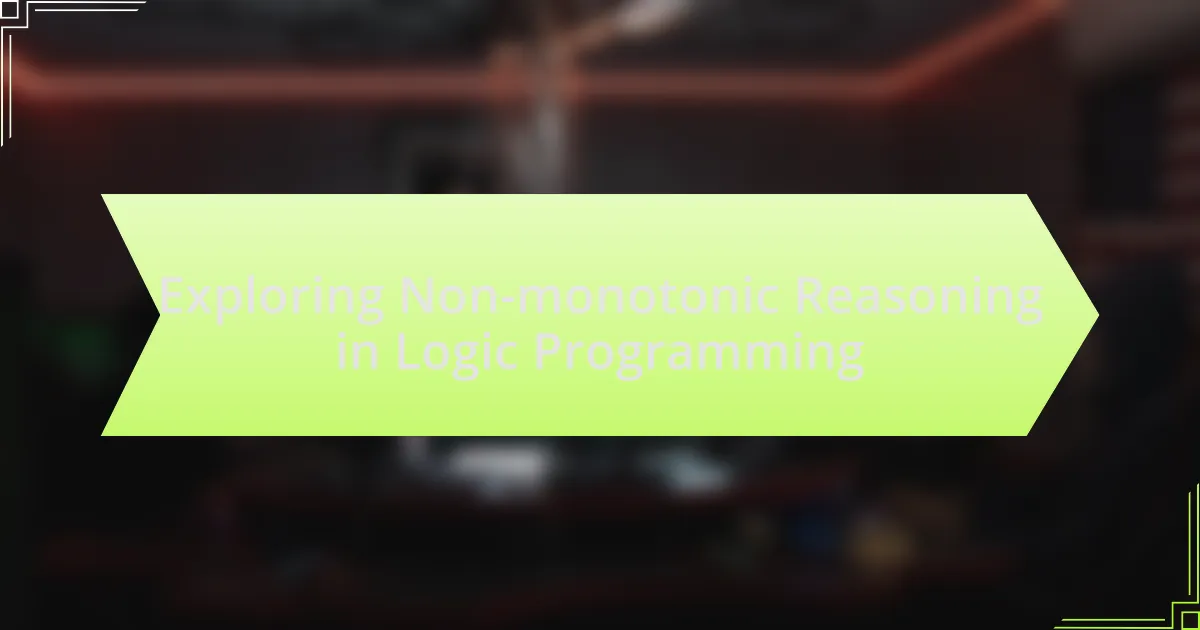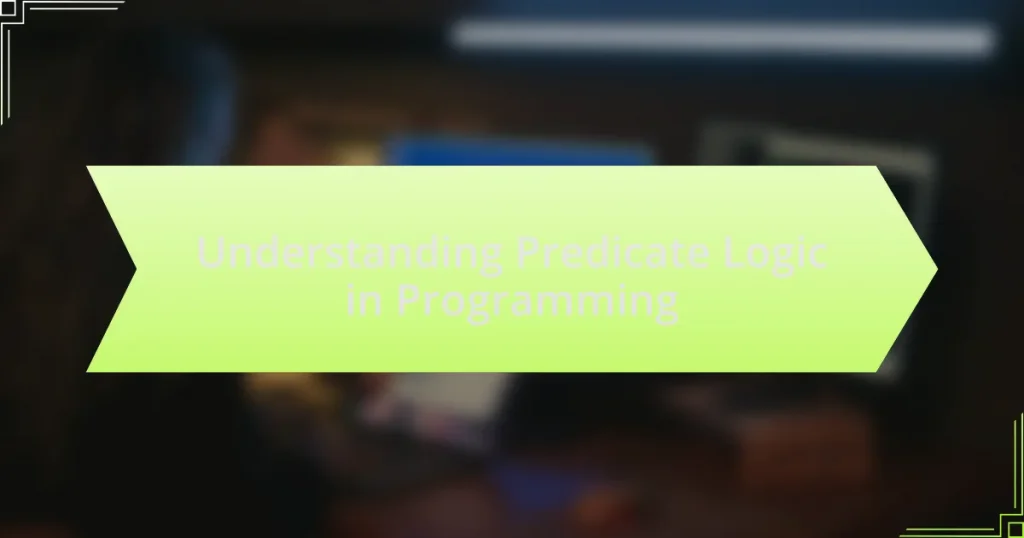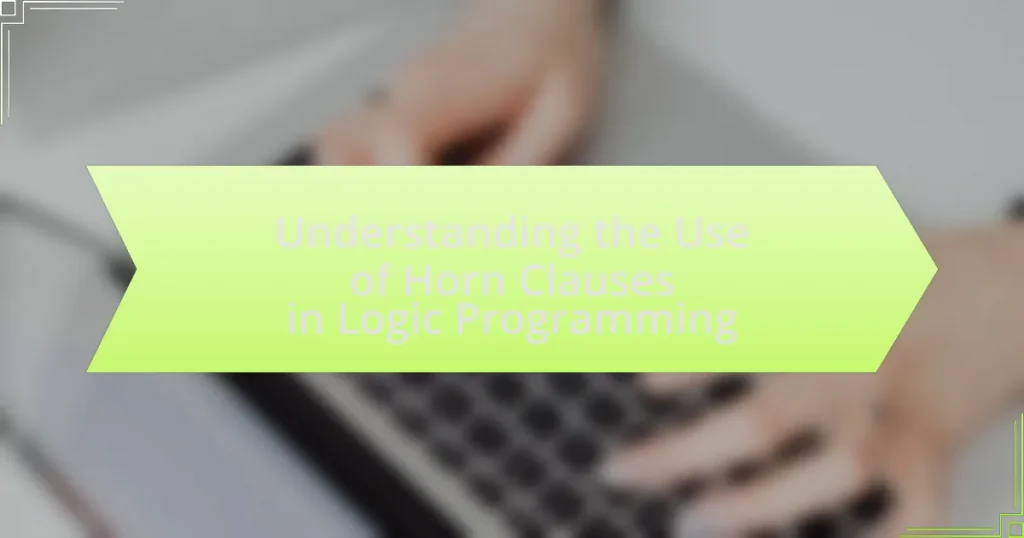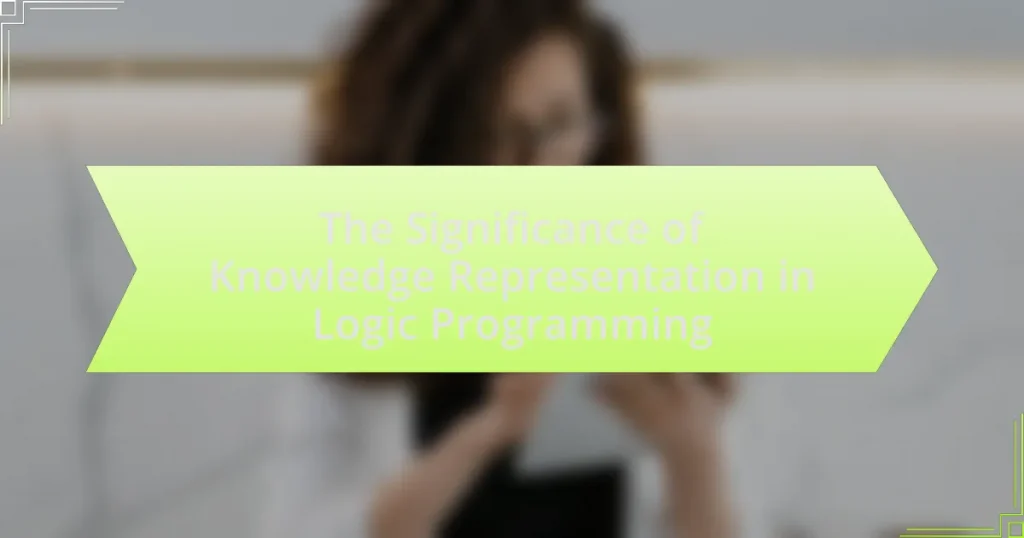Non-monotonic reasoning in logic programming is a type of reasoning that allows for the retraction of conclusions when new information is introduced, contrasting with traditional monotonic reasoning where conclusions remain valid regardless of additional data. This article explores the foundational concepts, key characteristics, and significance of non-monotonic reasoning, particularly in artificial intelligence and knowledge representation. It also addresses the challenges associated with implementing non-monotonic reasoning, including inconsistencies and computational limitations, while highlighting strategies for improving efficiency and reliability. Additionally, the article discusses future directions and emerging technologies that influence non-monotonic reasoning, emphasizing best practices for effective implementation in various applications.
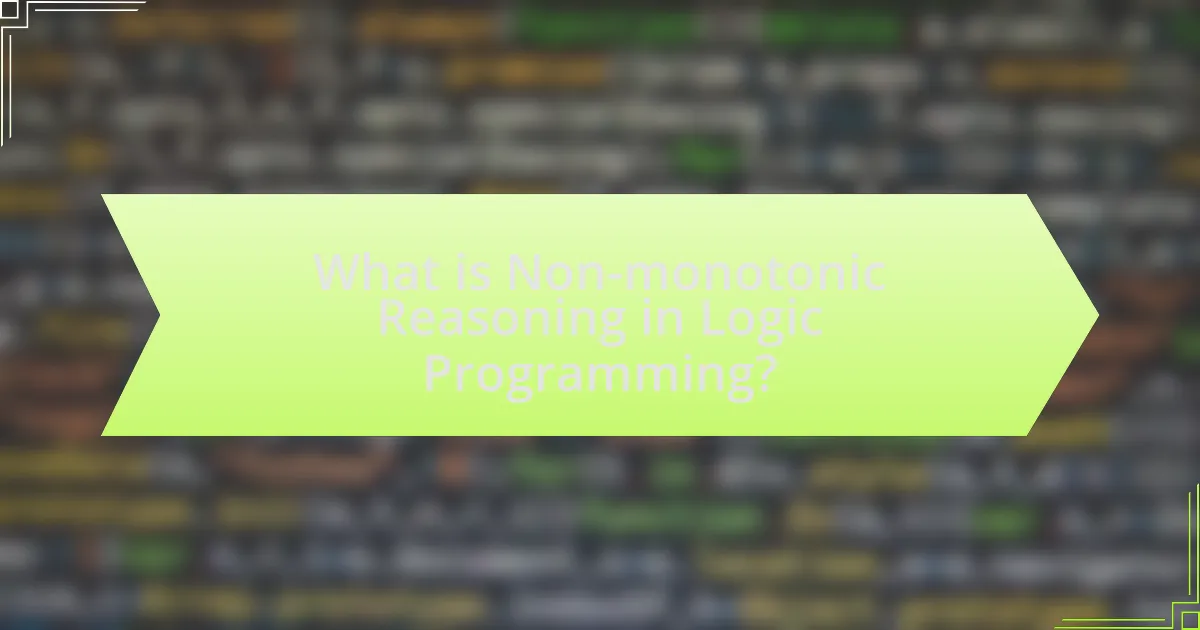
What is Non-monotonic Reasoning in Logic Programming?
Non-monotonic reasoning in logic programming refers to a type of reasoning where the introduction of new information can invalidate previous conclusions. This contrasts with monotonic reasoning, where once a conclusion is reached, it remains valid regardless of additional information. Non-monotonic reasoning is essential in scenarios where knowledge is incomplete or subject to change, such as in artificial intelligence applications. For example, in default logic, a common non-monotonic reasoning framework, conclusions can be drawn based on default assumptions that may be retracted when contradictory evidence emerges. This flexibility allows logic programming to better model real-world reasoning processes, where certainty is often elusive.
How does Non-monotonic Reasoning differ from traditional reasoning?
Non-monotonic reasoning differs from traditional reasoning in that it allows for the introduction of new information to invalidate previous conclusions. In traditional reasoning, once a conclusion is drawn, it remains valid regardless of any additional information; this is known as monotonicity. For example, in classical logic, if it is concluded that “all birds can fly,” this conclusion holds true unless the premises are changed. In contrast, non-monotonic reasoning, such as that used in logic programming, permits the revision of conclusions when new facts emerge, reflecting real-world scenarios where knowledge is often incomplete or evolving. This flexibility is essential for applications like artificial intelligence, where systems must adapt to new data and contexts.
What are the key characteristics of Non-monotonic Reasoning?
Non-monotonic reasoning is characterized by its ability to allow for the withdrawal of inferences when new information is introduced. This reasoning type contrasts with classical logic, where conclusions remain valid regardless of additional premises. Key characteristics include the flexibility to revise beliefs based on new evidence, the use of default reasoning to handle incomplete information, and the incorporation of context-dependent rules that can change the validity of conclusions. These features enable non-monotonic reasoning to better model real-world scenarios where knowledge is often uncertain or evolving.
Why is Non-monotonic Reasoning important in logic programming?
Non-monotonic reasoning is important in logic programming because it allows systems to make inferences that can be retracted when new information becomes available. This flexibility is crucial for modeling real-world scenarios where knowledge is incomplete or subject to change. For instance, in artificial intelligence applications, non-monotonic reasoning enables agents to adapt their beliefs based on new evidence, enhancing decision-making processes. The significance of this reasoning type is underscored by its application in various domains, such as legal reasoning and knowledge representation, where conclusions must be updated as new facts emerge.
What are the foundational concepts of Non-monotonic Reasoning?
Non-monotonic reasoning is a type of logical reasoning where the introduction of new information can invalidate previous conclusions. The foundational concepts include the idea of default reasoning, where conclusions are drawn based on typical cases unless contradicted by specific evidence; the use of belief revision, which involves updating beliefs in light of new information; and the concept of non-monotonic logics, such as circumscription and autoepistemic logic, which formalize how reasoning can change with additional knowledge. These concepts are essential for understanding how reasoning processes adapt to new information, reflecting real-world scenarios where knowledge is often incomplete or evolving.
How do defaults and exceptions play a role in Non-monotonic Reasoning?
Defaults and exceptions are crucial in non-monotonic reasoning as they allow for conclusions to be drawn based on typical cases while accommodating deviations. In non-monotonic reasoning, the introduction of new information can invalidate previous conclusions, reflecting real-world reasoning where defaults represent general rules and exceptions indicate specific cases that contradict those rules. For instance, in logic programming, defaults can be used to infer that “birds typically fly,” while exceptions like “ostriches do not fly” can be incorporated to refine the reasoning process. This dynamic interplay enables systems to adapt their conclusions based on the context and available information, making non-monotonic reasoning more flexible and realistic in modeling human-like reasoning.
What types of Non-monotonic logics exist?
There are several types of non-monotonic logics, including default logic, autoepistemic logic, logic programming with negation as failure, and circumscription. Default logic allows for the introduction of default rules that can be overridden by specific information. Autoepistemic logic extends propositional logic to include knowledge about knowledge, enabling reasoning about beliefs. Logic programming with negation as failure permits conclusions to be drawn based on the absence of evidence. Circumscription minimizes the extension of predicates to infer conclusions based on the least commitment principle. Each type serves distinct purposes in reasoning under uncertainty and incomplete information.
What are the applications of Non-monotonic Reasoning in Logic Programming?
Non-monotonic reasoning in logic programming is applied in areas such as knowledge representation, automated reasoning, and artificial intelligence. In knowledge representation, it allows systems to handle incomplete or changing information effectively, enabling them to revise beliefs based on new evidence. Automated reasoning systems utilize non-monotonic logic to draw conclusions that can be retracted when faced with contradictory information, enhancing flexibility in decision-making processes. In artificial intelligence, non-monotonic reasoning supports the development of intelligent agents that can adapt their reasoning based on dynamic environments, improving their problem-solving capabilities. These applications demonstrate the significance of non-monotonic reasoning in enhancing the robustness and adaptability of logic programming systems.
How is Non-monotonic Reasoning applied in artificial intelligence?
Non-monotonic reasoning is applied in artificial intelligence to enable systems to make inferences that can be retracted when new information becomes available. This approach is crucial for dealing with incomplete or evolving knowledge, allowing AI systems to adapt their conclusions based on changing circumstances. For instance, in knowledge representation and reasoning, non-monotonic logic frameworks, such as default logic and circumscription, facilitate the modeling of real-world scenarios where exceptions to general rules exist. These frameworks have been implemented in various AI applications, including expert systems and natural language processing, where the ability to revise beliefs in light of new evidence is essential for accurate decision-making.
What role does Non-monotonic Reasoning play in knowledge representation?
Non-monotonic reasoning plays a crucial role in knowledge representation by allowing systems to draw conclusions that can be retracted when new information becomes available. This flexibility is essential for modeling real-world scenarios where knowledge is often incomplete or subject to change. For instance, in artificial intelligence, non-monotonic reasoning enables systems to handle exceptions and revise beliefs, as seen in frameworks like default logic and circumscription. These frameworks provide mechanisms to represent and reason about defaults and exceptions, thereby enhancing the system’s ability to adapt to new information and maintain consistency in its knowledge base.
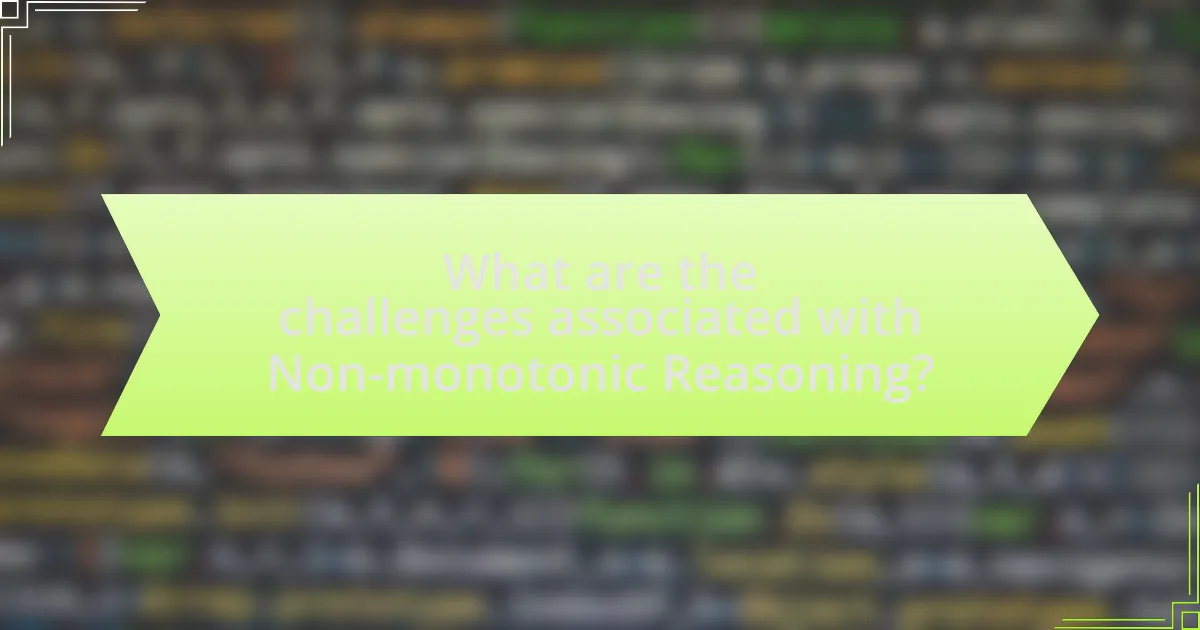
What are the challenges associated with Non-monotonic Reasoning?
Non-monotonic reasoning faces several challenges, including the difficulty of formalizing knowledge changes, handling inconsistencies, and ensuring computational efficiency. Formalizing knowledge changes is challenging because non-monotonic reasoning allows for the withdrawal of inferences based on new information, complicating the representation of knowledge. Handling inconsistencies arises when conflicting information is introduced, making it difficult to determine which inferences to prioritize. Additionally, ensuring computational efficiency is a challenge, as non-monotonic reasoning often requires complex algorithms that can be resource-intensive, impacting performance in practical applications.
What complexities arise in implementing Non-monotonic Reasoning?
Implementing Non-monotonic Reasoning introduces complexities such as the difficulty in managing contradictory information and the challenge of ensuring consistency in knowledge bases. These complexities arise because Non-monotonic Reasoning allows for the withdrawal of inferences when new information is introduced, which can lead to inconsistencies if not carefully managed. For instance, in systems like default logic or circumscription, the introduction of new facts can invalidate previous conclusions, complicating the reasoning process. Additionally, computational complexity increases as algorithms must account for multiple possible interpretations of knowledge, making it harder to achieve efficient inference.
How do inconsistencies affect Non-monotonic Reasoning systems?
Inconsistencies significantly undermine Non-monotonic Reasoning systems by disrupting their ability to draw conclusions based on incomplete or changing information. Non-monotonic Reasoning relies on the principle that adding new information can invalidate previous conclusions; however, when inconsistencies arise, they can lead to contradictory outcomes, making it difficult for these systems to maintain coherent reasoning. For instance, if a Non-monotonic Reasoning system encounters conflicting rules or facts, it may produce multiple, incompatible conclusions, which can hinder decision-making processes and reduce the system’s reliability. This phenomenon is well-documented in studies of logic programming, where inconsistencies are shown to complicate the inference process, leading to ambiguity and uncertainty in the derived knowledge.
What are the computational limitations of Non-monotonic Reasoning?
The computational limitations of Non-monotonic Reasoning include issues such as non-termination, complexity in reasoning processes, and difficulties in handling inconsistencies. Non-monotonic Reasoning often requires algorithms that can deal with an exponential number of possible interpretations, leading to high computational costs. For instance, the complexity of reasoning in certain non-monotonic logics, like default logic and circumscription, can be classified as NP-hard, making it computationally intensive. Additionally, the presence of contradictory information can complicate the reasoning process, resulting in potential inconsistencies that further hinder computational efficiency.
How can these challenges be addressed?
To address the challenges in exploring non-monotonic reasoning in logic programming, researchers can implement advanced algorithms that enhance reasoning capabilities. For instance, employing answer set programming (ASP) allows for the representation of complex knowledge and the handling of exceptions effectively. Studies have shown that ASP can efficiently manage non-monotonic reasoning by providing a robust framework for defining and solving problems with incomplete or contradictory information. Additionally, integrating machine learning techniques can further optimize the reasoning process, enabling systems to adapt and improve over time based on new data.
What strategies can improve the efficiency of Non-monotonic Reasoning?
Strategies to improve the efficiency of Non-monotonic Reasoning include the use of optimized algorithms, knowledge representation techniques, and heuristics. Optimized algorithms, such as those based on answer set programming, can reduce computational complexity by efficiently handling the inherent non-monotonicity in logic. Knowledge representation techniques, like using structured ontologies, enhance the clarity and accessibility of information, allowing for quicker inference processes. Heuristics, such as prioritizing certain rules or facts based on relevance, can significantly speed up reasoning by narrowing down the search space. These strategies have been validated through various studies, demonstrating improved performance in practical applications of Non-monotonic Reasoning.
How can formal methods enhance the reliability of Non-monotonic systems?
Formal methods enhance the reliability of non-monotonic systems by providing rigorous mathematical frameworks for specifying, verifying, and validating system behaviors. These methods enable the formalization of rules and exceptions inherent in non-monotonic reasoning, ensuring that systems can handle changes in knowledge without compromising correctness. For instance, model checking, a formal method, allows for exhaustive verification of system states against specified properties, thereby identifying potential inconsistencies or errors in reasoning. This approach has been demonstrated in various studies, such as the work by Clarke et al. (2001) on model checking, which shows that formal methods can significantly reduce the likelihood of errors in complex systems by systematically exploring all possible states and transitions.
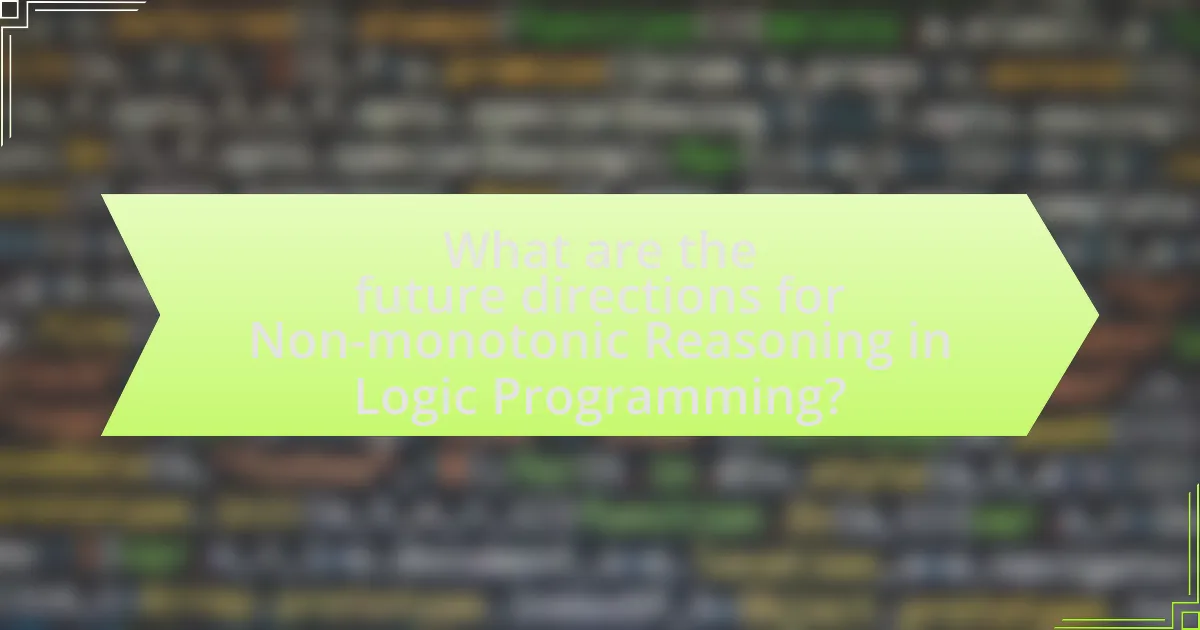
What are the future directions for Non-monotonic Reasoning in Logic Programming?
Future directions for Non-monotonic Reasoning in Logic Programming include enhancing integration with machine learning techniques, improving scalability for large datasets, and developing more robust frameworks for handling uncertainty. Research indicates that combining non-monotonic reasoning with machine learning can lead to more adaptive systems capable of learning from incomplete or evolving information. Additionally, advancements in algorithms and computational power are expected to facilitate the application of non-monotonic reasoning in real-time systems, thereby expanding its practical use in areas such as automated decision-making and knowledge representation.
How is research evolving in the field of Non-monotonic Reasoning?
Research in the field of Non-monotonic Reasoning is evolving through the integration of machine learning techniques and advancements in computational models. Recent studies, such as “Non-monotonic Reasoning with Neural Networks” by Zhang et al. (2022), demonstrate how neural networks can enhance traditional non-monotonic reasoning frameworks by enabling systems to learn from data and adapt their reasoning processes dynamically. Additionally, the exploration of hybrid approaches that combine logic programming with probabilistic reasoning is gaining traction, as evidenced by the work of Dung and Thang (2023) in “Probabilistic Extensions of Non-monotonic Logic.” These developments indicate a shift towards more flexible and robust reasoning systems capable of handling uncertainty and incomplete information effectively.
What emerging technologies are influencing Non-monotonic Reasoning?
Emerging technologies influencing Non-monotonic Reasoning include artificial intelligence, machine learning, and knowledge representation systems. These technologies enhance the ability to handle uncertainty and incomplete information, which are central to Non-monotonic Reasoning. For instance, advancements in machine learning algorithms allow for dynamic updates of knowledge bases, enabling systems to adapt their reasoning as new information becomes available. Additionally, knowledge representation frameworks, such as ontologies and semantic networks, facilitate the integration of Non-monotonic Reasoning into complex AI systems, improving their decision-making capabilities in real-world applications.
How might Non-monotonic Reasoning integrate with other logical frameworks?
Non-monotonic reasoning can integrate with other logical frameworks through the use of hybrid systems that combine classical logic with non-monotonic elements, allowing for more flexible reasoning in uncertain or dynamic environments. For instance, systems like Answer Set Programming (ASP) incorporate non-monotonic reasoning to handle defaults and exceptions, while still adhering to the principles of classical logic. This integration enables the representation of knowledge that can change with new information, as seen in applications such as knowledge representation and automated reasoning, where the ability to revise conclusions based on new evidence is crucial. The effectiveness of this integration is evidenced by its application in real-world scenarios, such as in artificial intelligence systems that require adaptive decision-making capabilities.
What best practices should be followed when working with Non-monotonic Reasoning?
When working with Non-monotonic Reasoning, it is essential to adopt best practices such as clearly defining the context and assumptions, utilizing formal frameworks like default logic or circumscription, and ensuring consistency in knowledge representation. Clear context and assumptions help in understanding the boundaries of reasoning, while formal frameworks provide structured methods for handling exceptions and changing information. Consistency in knowledge representation is crucial to avoid contradictions that can arise from non-monotonic reasoning. These practices enhance the reliability and effectiveness of reasoning processes in logic programming.
How can practitioners effectively implement Non-monotonic Reasoning in projects?
Practitioners can effectively implement Non-monotonic Reasoning in projects by utilizing logic programming frameworks that support default reasoning and belief revision. These frameworks, such as Answer Set Programming (ASP) and Prolog, allow for the representation of knowledge that can change with new information, enabling systems to adapt to evolving contexts. For instance, ASP provides a way to define rules that can be retracted or modified based on new inputs, which is essential for handling incomplete or changing information. This adaptability is crucial in applications like automated decision-making systems, where the ability to revise conclusions based on new evidence is necessary for accuracy and relevance.
What common pitfalls should be avoided in Non-monotonic Reasoning applications?
Common pitfalls to avoid in Non-monotonic Reasoning applications include neglecting the context of knowledge updates, which can lead to incorrect conclusions. In Non-monotonic Reasoning, the introduction of new information can invalidate previous inferences, so failing to properly manage this context can result in logical inconsistencies. Additionally, overlooking the computational complexity of reasoning processes can hinder performance, as certain algorithms may become inefficient with increased knowledge bases. Lastly, not adequately addressing the potential for ambiguity in knowledge representation can cause misinterpretations, leading to flawed reasoning outcomes. These pitfalls highlight the importance of careful design and implementation in Non-monotonic Reasoning systems.
